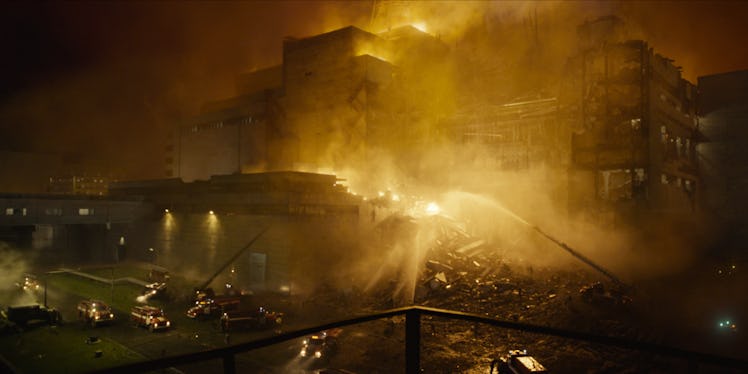
5 Questions Fans Have After Watching The 'Chernobyl' Finale
The finale for HBO's gripping series Chernobyl aired on Monday, June 3. Though the series had premiered back at the beginning of May, it took Game of Thrones clearing out before most viewers began to tune in. The five-episode series covers the first few days after the explosion, before slowly telescoping outwards to include the initial containment of the reactor core and the 1987 trial of those who ran the plant. But these questions fans have after watching Chernobyl show that HBO has tapped into a corner of history everyone has heard of, but few know the facts.
When the news of Chernobyl first hit in 1986 in western media, the hysteria was instantaneous. UK and US tabloids suggested thousands were already dead, and the lives of millions could be endangered, including those in Western Europe as clouds of radiation drifted westward. These exaggerations weren't helped by the USSR falsely claiming everything was fine when tests showed otherwise.
The result is that many know of Chernobyl, but few know how things turned out after the events of the finale. While the series attempts to clear up some of the misinformation, those who are curious about how things stand today still have questions.
01How Many People Died Because of Chernobyl?
It's a complicated question because the effects of radiation aren't easy to track.
- The Russian official death toll is 31. Those are the deaths directly stemming for the accident.
- Nuclear activists say 93,000. This is the "inclusive" number, aka anyone living anywhere near the fallout zones who died of cancer, whether it can be proven as caused by Chernobyl or not.
- The most commonly accepted number is ~4,000, aka deaths that can be reasonably tied back: For example, the people on the bridge, Lyudmilla Ignatenko's child who died four hours after being born, Legasov's death, etc.
02What Happened To The Men On Trial?
The USSR charged Viktor Bryukhanov, Nikolai Fomin, and Anatoly Dyatlov for Chernobyl. Though the explosion was not entirely their fault, all three contributed by creating a lax safety culture and lying to cover it up. All three were sentenced to 10 years hard labor.
All three served less than five years. Fomin attempted suicide and was moved to a mental institution. Dyatlov's health issues from the fallout meant he spent lots of his sentence hospitalized. All three were released in 1991, given amnesty upon the dissolving of the USSR.
03What Happened To Boris Shcherbina?
In the finale, Boris tells Legasov he's been given a year to live. He did better than predicted. Despite his illness, in 1988, he was put in charge of cleaning up the Armenia earthquake disaster. Due to the lessons he learned from Chernobyl, he insisted on bringing in international help to find survivors, saving dozens of lives.
He succumbed to his radiation illness in 1990.
04When Will Chernobyl Stop Being Radioactive?
This too is a complicated question.
- The most common answer is 20,000 years. But that's "the elephant's foot" aka, the melted remains of the reactor core, which is now housed in a state of the art containment structure as of 2018.
- In some areas, the answer is several hundred years. Those are the spots where pieces of the reactor fell in the explosion. They have been buried, but are still leaking into the surrounding land.
- Most of the current "Exclusion Zone" will supposedly be fine in 20 years, now that the new containment structure is up.
- In fact, some people have already started to return, believing it is "safe enough." Most of these are elderly people, who see themselves as going home to die anyway.
05Could Another Chernobyl Happen Today?
Nuclear power plants may have halted construction post-Chernobyl, but they didn't all disappear overnight. There are still 10 RBMK-1000 reactors in use in Russia right this second. Other water-based nuclear reactors are operating around the world. In 2011, the Fukushima power plant in Japan had a Chernobyl-level meltdown after a tsunami.
The difference between Fukushima and Chernobyl: Japan was open about the calamity. Help raced in from around the world to contain Fukushima, which is why there were zero deaths.
Another nuclear disaster could happen at any time, anywhere in the world. But another Chernobyl? That will only happen if people respond to it with lies and fear.